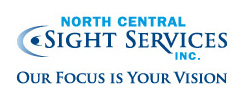Nov 30, 2020 02:16PM ● By Linda Roller

The building on 2121 Reach Road in Williamsport looks like many of the other manufacturing plants located there. Even the lobby, with the sign-in log, the waiting chairs—all standard issue. But walk through the doors of the plant, and there is a difference, and an organization that has made a difference for decades for people with sight problems.
“People remember us for services we did twenty to thirty years ago—rubber mats and brooms, reading to the blind. Now we’re getting known for shredding services,” Katie Coffey, quality and marketing director of North Central Sight Services comments as we wandered through the 68,000 square-foot-shredding, packaging, and distribution center. It’s a long way from the four-story building in a residential area of Williamsport, where the mats and brooms were made, both in terms of facilities and in the range of services provided to government, industry, and the public.

Many things changed with the move in 2007. The brooms and mats are long gone. Now North Central Sight Services is a government contractor for CDs, DVDs, USB flash drives, and other office supplies. According to Katie, that program is launching a commercial site so the public can also purchase these items from NCSS. Through ncsight.com, over 40,000 products are available. “It’s hard to compete with the ‘big box stores,’ but all the [profits] go to the community,” she says. With the difficulty in obtaining masks and hand sanitizer, NCSS swung into action, finding suppliers in the U.S., and making these vital items available to the region at a reasonable cost, with the profit supporting our region.
Then there is the vending program, with trucks from NCSS filling machines throughout the seven county service area. That, along with the bottleless water cooler service, keeps NCSS trucks busy all over the region.
But the “star” of the show these days is document shredding, a service in over twenty Pennsylvania counties. NCSS provides a secure storage area, used for short term holding of material for shredding. Organizations can also contract long-term storage for business files. A company can even use NCSS to store information until the date that the company wants it destroyed, then have it shredded on that date. They provide a pick-up and delivery service, a barcode tracking system for a business, and file boxes for material. There is even a walk-up service, where anyone can bring papers and electronic media to be shredded, watching as their documents become confetti for thirty-five cents a pound. The area is secure and even the personnel is secure, as the employees who handle this material and run the shredding machines are visually impaired. No one sees sensitive documents.

NCSS’s varied services not only fill government contracts and provide services to businesses in the region, but also provide employment for people who are blind or visually impaired. Around sixty percent of the staff is visually impaired. Even the trucks are staffed by visually impaired people, with sighted people driving the truck to the work site or company that has contracted for the NCSS service. Visually impaired people work the vending service, again with a sighted co-worker. Even the CEO of North Central Sight Services is visually impaired. The employment opportunities are important, as the majority of people with sight problems in this country are unemployed. Here, work stations are set up for people who cannot see. It’s a plant designed for the visually impaired to work in a modern service and distribution plant.
The employment opportunities are only half the story, though. For this organization, through the work it does, generates money for the services it provides, like vision screenings, to the seven county service area and beyond. Currently, the NCSS program serves Head Start in Towanda, Canton, and Troy. They also provide the service to the Northern Tioga School District, along with sites in Lycoming and Clinton counties. They are working on getting vision reports from various school districts, to improve the service in K-12 across the region. NCSS screens 5,000 children a year.
The screening goes beyond children. North Central Sight Services provide health fairs in places like Truck-Lite in Wellsboro and Con-Agra in Wyalusing. The Tioga Downs Casino in Nichols, New York, recently provided $30,000 for mobile labs used by NCSS to serve the communities of the area.
The COVID-19 pandemic has changed some of what NCSS offers to the general community.
“Vision impairment is isolating, and the pandemic has made that worse,” Katie explains. “We have adapted to the changes.” Client care specialists at NCSS call people regularly to check on them and provide a friendly voice in a world that feels more distant and unavailable.

Then, there are the electronic and mechanical helps for the blind and visually impaired. Technology has changed these tools, even as the large clocks and numbers are still used. Now, new large monitors and software can magnify print so that someone impaired can read any document as it is displayed on a computer screen. There’s even an app for phones that can take a picture of some printed material and read the label verbally on cans or containers. These computerized helps bring a new level of independence to the everyday life of those who have lost their sight and helps to fight the isolation that a lack of sight can create. NCSS helps visually impaired people, who are often on a limited income, afford these important aids to a richer, more independent life.
It’s a long way from reading to the blind, a service that North Central Sight Services provided back in 1957 as the Blind Association. But the idea of serving the visually impaired and the community at large remains the same. Through technological help, vision screenings, education, and personal support, North Central Sight Services provides and protects a more independent future for those of us with vision problems, and, through that care, to the entire community.
Find out more at (570) 323-9401 or at ncsight.org.
The above article was published in December’s issue of Mountain Home Magazine.






